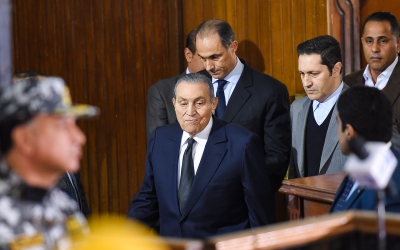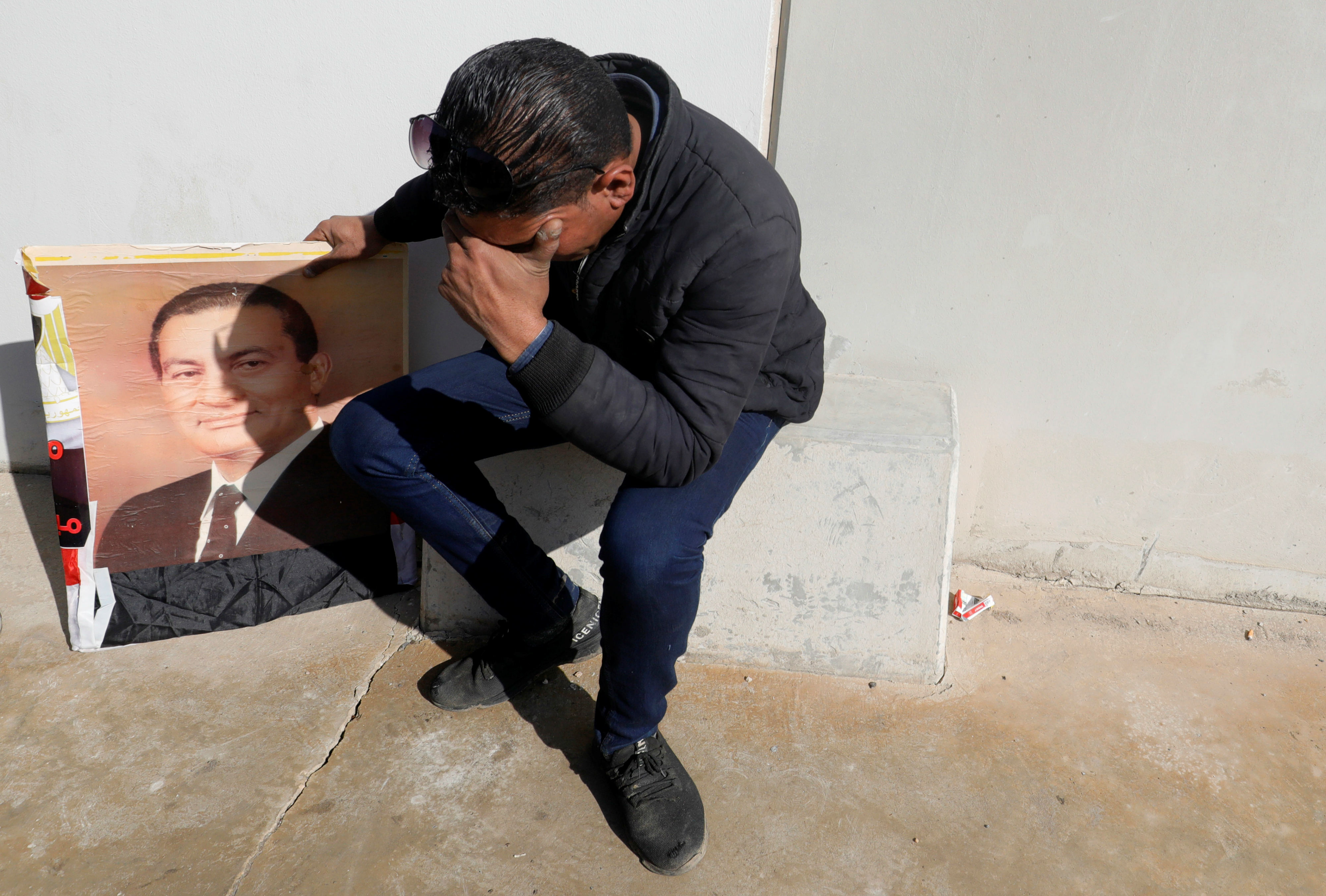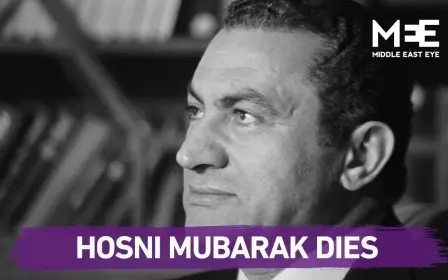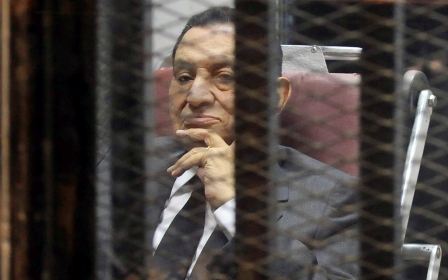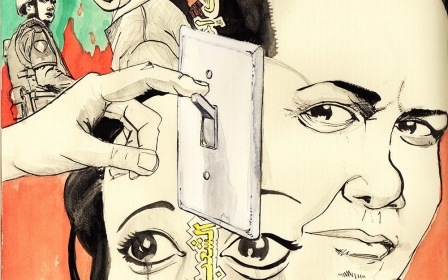'End of a ruthless dictator': Egyptians mull Mubarak's legacy
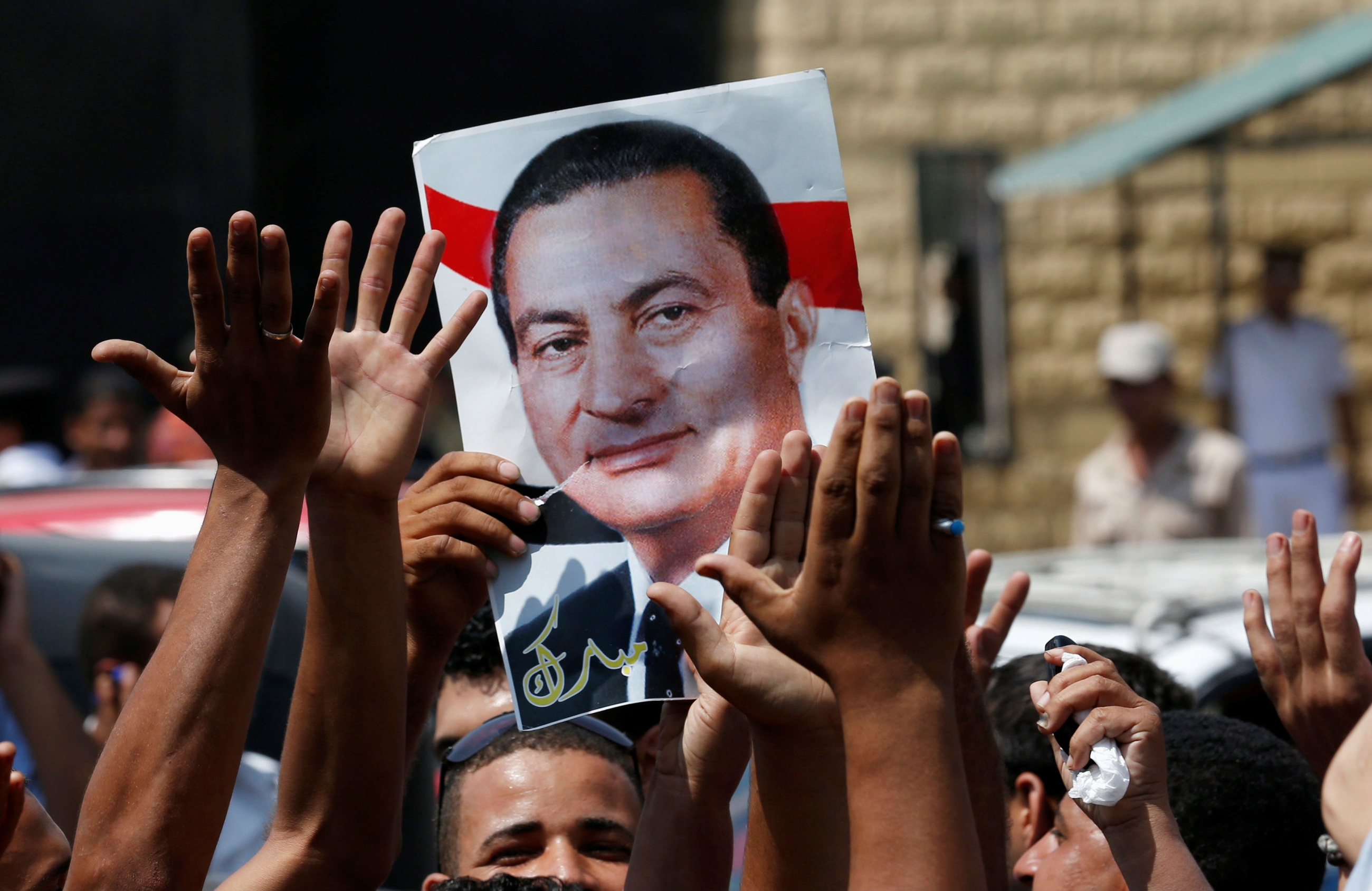
Small celebrations erupted in Ahmed’s home in Suez on Tuesday as Egyptian state TV announced the death of ousted president and autocrat Mohamed Hosni Mubarak.
He had reason to celebrate. Ahmed* is one of thousands of protesters who was wounded by security forces as he defied the January 2011 crackdown on the uprising that eventually ended Mubarak’s 30-year rule.
Security forces shot him in front of the Suez Police Station twice, wounds that left him semi-paralysed and not able to pursue his career as a chef.
In Suez, 17 people were killed during the revolution and dozens wounded, which stoked local anger to the extent that officers were forced to drop their weapons and give up.
“As a human being I am celebrating that the person who was in charge of destroying my dreams will be questioned by God. But as a Muslim, I have nothing to say but pray that God may have peace on his soul,” Ahmed, who is now a 38-year-old cashier at a local supermarket, told Middle East Eye.
In the hours that have followed Mubarak’s death, his victims have bemoaned the soft treatment he received from the judicial system – particularly at a time when many of the heroes of that same 2011 revolution are now languishing in jail.
After falling from power, Mubarak faced multiple charges and was convicted of conspiring to kill protesters. However he was acquitted and freed in 2017, much to the revolutionaries’ disgust.
“May he receive the trial he never got when he was alive,” the emotional Ahmed said.
Egyptians divided
The death of the former army officer and 1973 Middle East war veteran left Egyptians divided.
Some have opted for panegyric commemoration of Mubarak as a fatherly figure and war hero.
Others condemned him as an ousted dictator seen as the cause of decades of corruption, police brutality and political crisis, and a figure who paved the way for current President Abdel Fatteh el-Sisi’s repressive rule.
In Cairo, the Egyptian presidency declared a three-day state of mourning, with media outlets announcing that the armed forces’ late supreme commander will receive a military funeral.
Rania was born 1981, the same year Mubarak took office after escaping death during the assassination of then-president Anwar al-Sadat.
'He annihilated all kinds of opposition for 30 years, destroyed political life, and planted the seeds for a military dictatorship, which eventually lead us to Sisi’s regime'
- Rania
“Politics aside and repression aside, Mubarak committed crimes with his policies and rule which has defamed contemporary Egyptian society,” Rania, who works as a teacher, said.
“He annihilated all kinds of opposition for 30 years, destroyed political life, and planted the seeds for a military dictatorship, which eventually lead us to Sisi’s regime.”
Sisi gained power in a 2013 military coup, removing Mubarak’s successor Mohamed Morsi, the first freely elected president in Egypt’s history. In the seven subsequent years, Egypt’s military has consolidated power and cracked down on dissent or independent voices.
Egypt has jailed around 50,000 political prisoners under Sisi’s rule, rights groups say.
“[Mubarak’s] worst crime was not the killing of protesters but setting the scene for a political sphere where only the military is the most powerful force,” Michael, a political science student from Assuit, told MEE.
“This made the military the sole controller of every aspect of society, which eventually led to the deadly crackdown from 2013 till now.”
Many think the special treatment of Mubarak, dead and alive, is part of the Egyptian government’s attempts to antagonise the 2011 revolution, which defied police violence and corruption, and called for social justice and accountability.
“Giving Mubarak a military funeral is a clear statement of embracing his rule and condemning the revolution,” said Milad, a 36-year-old taxi driver.
“There’s no way the regime would have criticised Mubarak, dead or alive, otherwise they would be condemning themselves.”
Adil, a government employee, also noted the continuity: “Let’s not forget that the regime’s generals, from the lowest ranking to the highest, have served under Mubarak. Sisi himself was a high-ranking intelligence officer.”
Many Egyptians offered comparisons between Mubarak’s treatment as a deceased former president and Morsi’s. Morsi died last year after suffering dreadful conditions in prison, and was buried secretly in a tiny service. He was stripped of the title president when referred to in the media.
The difference between the two deaths reflects how differently the state treats military personnel and civilians, Dalia said.
“When a military man dies, even if he was found guilty of corruption, he gets praise and a big funeral,” she told MEE. “But when an innocent civilian politician and university professor dies from ill-treatment in prison, his body gets buried in the dark with no respect.”
War hero
Mubarak’s military history - he was an airforce commander during the 1973 war with Israel - commands respect for a lot of Egyptians.
“The man was a war hero who fought so we can have our freedom. The least we can do is lay him to rest be respectful,” computer engineer Saed said.
On social media, several users used religious discourse to dismiss any condemnation, calling on Egyptians to “remember the good deeds of our dead”.
Rania was beaten and briefly detained during the 2011 revolution, and she also believes that it’s better to remember the good deeds of the dead.
'Like Thatcher, Mubarak was a big reason for putting hardships on the working class and the impoverished. His death should be a symbol for the end of a ruthless dictator'
- Samir, activist
“But,” she added, “I cannot find any good deeds for Mubarak and his time. My father was laid off from a governmental factory which was privatised leading us to live in impoverishment. My aunt died from kidney failure from the sink water. My sister suffered from hepatitis C and died as a result. And I was fired from my job because my husband was politically active.”
Samir, an activist and social worker who was arrested seven times under Mubarak, said he cannot ask God for mercy for a person who normalised torture and police brutality in police stations and prisons.
“Even if he died in his bed among his family, history will remember him as a leader who didn’t respect his countrymen when they were alive. So we don’t have to respect him when he is dead,” he said.
Samir likens the mood to the scenes of celebration that took part in some parts of the UK in April 2013 following the death of Margaret Thatcher, a divisive former British prime minister whose policies transformed the British economy in the 1980s but also caused devastation and unemployment in many traditional working class communities.
“Like Thatcher, Mubarak was a big reason for putting hardships on the working class and the impoverished. His death should be a symbol for the end of a ruthless dictator.”
*All names have been changed for security reasons
This article is available in French on Middle East Eye French edition.
Middle East Eye delivers independent and unrivalled coverage and analysis of the Middle East, North Africa and beyond. To learn more about republishing this content and the associated fees, please fill out this form. More about MEE can be found here.


